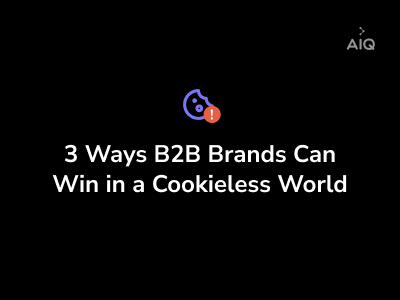Build your own walled garden
January 17, 2022Did Google just drop a bomb on the internet, or was it a massive smoke screen? Most industry insiders claim the latter but for those who haven’t heard, Google announced that it will not build alternative identifiers to track people as they traverse the open web. Google wants to improve its reputation as privacy-friendly, which it should, given the shift in the privacy and regulatory environments in recent years.
Google’s moves around discontinuing support of third party identifiers may seem bold on the surface, but remember they operate a massive network of properties that are connected via a logged in experience giving them an extraordinary data and identity footprint that is basically unmatched:
- Android owns approximately 85% of the smartphone market share globally,
- Chrome owns 63% of the total browser market share,
- Gmail owns 28% of the email market share,
- Google search owns 92.5% of the market share
- YouTube has 2.3B users worldwide, making it the second largest social platform after Facebook.
So what can brands take away from their move?
Controlling your destiny
If Google’s announcement has shown us anything, organizations today must eliminate their dependencies rather than manage to them. This is to say that brands have to control their own destiny, rather than outsourcing or renting their results.
The reality is that brands are no longer built on a media plan. Brands today are built on world-class customer experiences that are relevant and personalized. Pouring money into ad spends can be an effective tactic for short term results, but brands need to establish a long term relationship with customers today by delivering the types of experience that make their lives’ easier or better. That requires breaking the addiction to the quick fix.
Breaking the addiction starts with building the proper data foundation. Creating and implementing a first-party data strategy isn’t easy though, it requires planning and collaboration from many people across the business. This is the bedrock for sustainable engagement independent of channel, screen, or platform.
Breaking the cycle of dependency
While consumers are willing to exchange personal information for relevant offers from a trusted product or service, they don’t want to be the product. That is to say that nobody wants their personal data commingled with millions of other people’s data to optimize results for a business they have no relationship with. That’s why we are where we are today with Google deciding to move forward into a more privacy friendly future. While some ad tech players may be lining up to fill the void, businesses should be deliberate in their approach rather than look for a quick replacement.
The most successful companies know that customer data, and the ability to organize it, integrate it, and action on it as fast as possible, is what gives them a massive competitive advantage. In the wake of COVID, where every business must operate as a digital native; investing in customer data infrastructure is not a luxury reserved for the most sophisticated; it’s a matter of survival. David has the tools at his disposal to battle Goliath, but he has to embrace a new approach.
Today, every business can, and should, build their own walled garden and take ownership of their customer relationships. To do so, businesses have to integrate data across different sources and systems to create rich customer profiles and improve customer experience across digital touchpoints, thus creating a virtuous cycle.
The future is now
The Covid pandemic has dramatically accelerated the move to digital with businesses advancing their digital roadmaps in order to remain competitive. For many companies, we now know that digitization accelerated a decade in a single year.
Hope is not a strategy, and businesses would be foolish to bet on decreased regulation or they can see this week’s announcement as what it is – a fundamental shift in how they will need to do business moving forward.
What better time is there to start building the foundation for the future than now? Accumulating a unified first-party customer data asset that can be easily integrated into any application used across the business, while respecting the need for privacy and security should not be viewed as a nice to have.
If you’ve ever done a remodel on your home, you know the dread of starting and the delight in finishing. Most times you wished you had done it sooner. Tens of thousands of companies have already started to remodel their customer engagement strategies, their analytics and measurement strategies, and their data warehousing strategies. Now is the time to get off the privacy roller coaster and take back the relationships with your most valuable asset, your customer.


